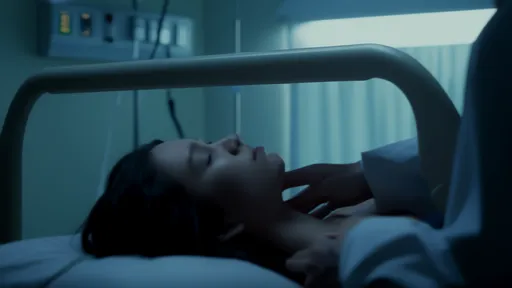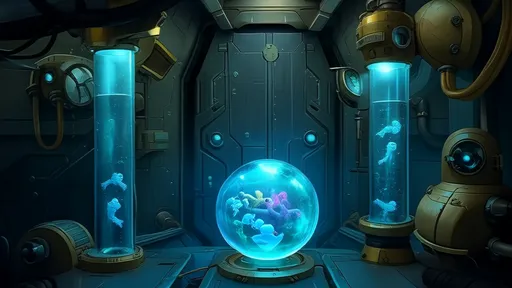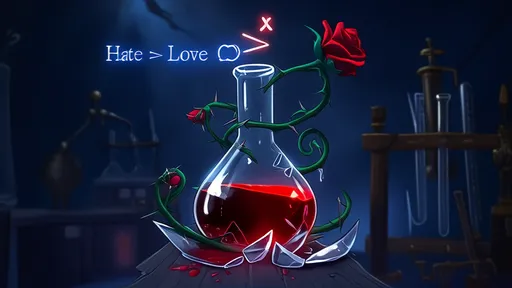In a nondescript building on the outskirts of Berlin, psychologists are conducting controversial experiments that would make most romantics shudder. The so-called "Aversion Therapy Lab" has been quietly developing physiological interventions to treat what they clinically term "romantic obsession disorder" - what social media generations commonly call "love addiction" or "relationship OCD."
The Science Behind the Squick
Dr. Helena Voss, the lead researcher, explains their methodology while standing beside what looks like a dentist's chair modified with additional straps and monitoring equipment. "We're not torturing people, despite how it might appear," she says with a dry smile. "We're simply creating conditioned physiological responses to interrupt maladaptive romantic fixation patterns."
The treatment protocol involves exposing subjects to stimuli associated with their romantic fixation - whether photographs, scent samples, or audio recordings - while simultaneously introducing mild but unpleasant physical sensations. These range from bitter-tasting sprays to uncomfortable (but harmless) electric pulses administered through fingertip electrodes.
"The brain learns remarkably quickly to associate the object of obsession with physical discomfort," explains Dr. Voss. "Within 8-12 sessions, most patients report significantly reduced intrusive thoughts about their romantic fixation."
Ethical Firestorm
The lab's work has drawn sharp criticism from multiple quarters. Dr. Raj Patel, a neuroscientist at University College London, calls the approach "ethically dubious 21st-century conversion therapy." In a scathing editorial in The Lancet Psychiatry, he argued that "pathologizing normal human attachment and attempting to 'cure' it through aversion techniques sets dangerous precedents."
Patient advocacy groups have been particularly vocal. "This isn't therapy - it's operant conditioning being dressed up as medicine," says Mira Chen of the Mental Health Rights Collective. "They're essentially trying to Pavlov people out of having feelings."
The lab maintains strict ethical protocols, requiring multiple psychiatric evaluations before accepting patients and excluding anyone with a history of trauma or certain personality disorders. "We only treat cases where romantic fixation has caused demonstrable life impairment," stresses Dr. Voss. "People who've lost jobs, been hospitalized after stalking incidents, or attempted suicide over unrequited feelings."
Inside a Session
Journalists were permitted to observe a anonymized session with "Patient M," a 29-year-old man whose three-year obsession with a coworker had resulted in a restraining order. Wired to physiological monitors, he was shown a photograph of the woman while researchers administered alternating stimuli - first a blast of foul-smelling odor, then a recording of her voice paired with a mild finger shock.
"It's not pleasant," Patient M admitted afterward, rubbing his fingertips. "But neither was spending hours every day imagining conversations with someone who wants nothing to do with me. If this helps me move on, it's worth some discomfort."
The lab claims a 68% success rate in their pilot study, defining success as at least 50% reduction in obsessive thoughts and behavioral impulses at six-month follow-up. Critics counter that their metrics are subjective and that long-term effects remain unknown.
The Bigger Picture
This controversial approach emerges against growing concerns about mental health impacts from dating apps and social media. Some researchers argue these technologies have created unprecedented conditions for obsessive romantic fantasies to flourish, with endless digital access to crush's photos and activities replacing the natural boundaries of pre-internet courtship.
"We're seeing more extreme cases of romantic fixation than ever before," notes Dr. Voss. "Traditional talk therapy moves too slowly for someone spiraling into dangerous behavior patterns in real-time."
Meanwhile, the lab is developing less invasive protocols using virtual reality and haptic feedback systems. Early trials suggest these may achieve similar results without physical discomfort - simply by breaking the emotional intensity of fixation through repeated neutral exposure.
As debates continue about where to draw lines between therapy and behavior modification, one thing remains clear: in our hyperconnected age, the human heart continues to defy easy solutions - whether chemical, behavioral, or technological. The Berlin lab's radical experiments may represent either a troubling overreach of clinical intervention or a necessary innovation for addressing love gone pathological in the digital era - depending on whom you ask.

By /Jul 3, 2025

By /Jul 3, 2025

By /Jul 3, 2025

By /Jul 3, 2025

By /Jul 3, 2025

By /Jul 3, 2025

By /Jul 3, 2025

By /Jul 3, 2025

By /Jul 3, 2025

By /Jul 3, 2025

By /Jul 3, 2025

By /Jul 3, 2025

By /Jul 3, 2025

By /Jul 3, 2025

By /Jul 3, 2025

By /Jul 3, 2025

By /Jul 3, 2025

By /Jul 3, 2025

By /Jul 3, 2025

By /Jul 3, 2025